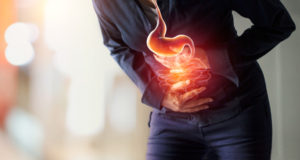 You may not immediately relate stomach pain or digestive issues to your recent car crash, but they can be connected and should be taken as seriously as any other symptoms. While it may be nothing or related to the stress of the event, these symptoms can point to other, serious injuries that require medical attention from a car accident doctor in College Park. These symptoms can often appear hours or days after the original accident, making you question if you should seek care or not. But in cases of abdominal pain, you are better off getting an evaluation quickly.
You may not immediately relate stomach pain or digestive issues to your recent car crash, but they can be connected and should be taken as seriously as any other symptoms. While it may be nothing or related to the stress of the event, these symptoms can point to other, serious injuries that require medical attention from a car accident doctor in College Park. These symptoms can often appear hours or days after the original accident, making you question if you should seek care or not. But in cases of abdominal pain, you are better off getting an evaluation quickly.
Delayed Symptom Injuries
While some injuries will be obvious immediately after a crash, like cuts or broken bones, others can be hidden. The stressful events of an accident can cause victims to go into shock and the body may release adrenaline in response to the chaos. This acts as an endorphin and can hide pain that would otherwise be felt, allowing you to continue on as if nothing has happened. While you may feel okay, dangerous things can be happening in your body before you even notice. In this time period, the injury can worsen and become more serious before you have sought treatment. For this reason, it’s crucial to see a car accident doctor in College Park immediately following your accident, even if you don’t feel any pain or symptoms.
Common Causes of Stomach Pain and Issues
In some cases, the stress of an accident and surrounding events may be enough to cause gastrointestinal symptoms like diarrhea, nausea, or vomiting. This may occur quickly after the events or in the following time as you recover. If this passes quickly, it is likely related to stress and should simply be monitored. However, other symptoms persist and should be evaluated by a car accident doctor in College Park.
While these symptoms can indicate a wide range of injuries, there are common causes that a doctor will look for first. Many of them are considered a part of Seat Belt Syndrome.
Seatbelts are typically made of two parts- the upper strap that is diagonal across your torso and a lower strap that is across your lap like a belt. Both parts are crucial in saving lives, but they may cause some damage of their own upon impact. When you are thrown forward by the impact of an accident, the lower strap can cause a “bruise” on the lap. This may actually be multiple bruises or welts along the waist, and may not appear immediately. The marks can range from mild to severe in looks and pain.
These bruises may be only external, but can often signify more serious internal injuries as well. If the belt causes enough impact, it can cause internal bleeding within the body as a result of blood vessel damage. If internal bleeding occurs, it strains the circulatory system and can lead to a drop in blood pressure or even fatalities and infections. Symptoms of internal bleeding may include stomach pain, blood in the stool and urine, dizziness, loss of vision, and shortness of breath.
Along with internal bleeding, organ damage is also possible and without proper treatment, the organs can fail over time. Common examples include bowel obstruction from intestinal damage, peritonitis or inflammation, liver damage, ruptured spleen, appendicitis, or kidney trauma.
Any gastrointestinal damage may lead to diarrhea or other digestive issues, so those symptoms should be taken seriously as well. Swelling in the abdomen is also a sign that something abnormal is going on and can indicate internal bleeding, organ damage, or appendicitis and therefore requires attention.
When to Seek Care
If you notice these signs and symptoms, contact a college park chiropractor, orthopedist, car accident doctors, and other specialists that might be able to address your injuries. When allowed to worsen, these injuries can lead to serious issues requiring surgery and other life-saving procedures. Certain symptoms like blood in the stool and urine, low blood pressure, or severe and worsening pain should be seen as quickly as possible.
At AICA College Park, our specialists take a holistic and comprehensive approach to your care. Because we specialize in car accident victims, we know the symptoms to look for to quickly identify and treat any internal injuries, even before they become severe. Chiropractors, orthopedists, neurologists, and other team members will work together to determine the root cause of your symptoms and develop a treatment plan based on their different perspectives. Contact AICA College Park today to begin addressing these symptoms.